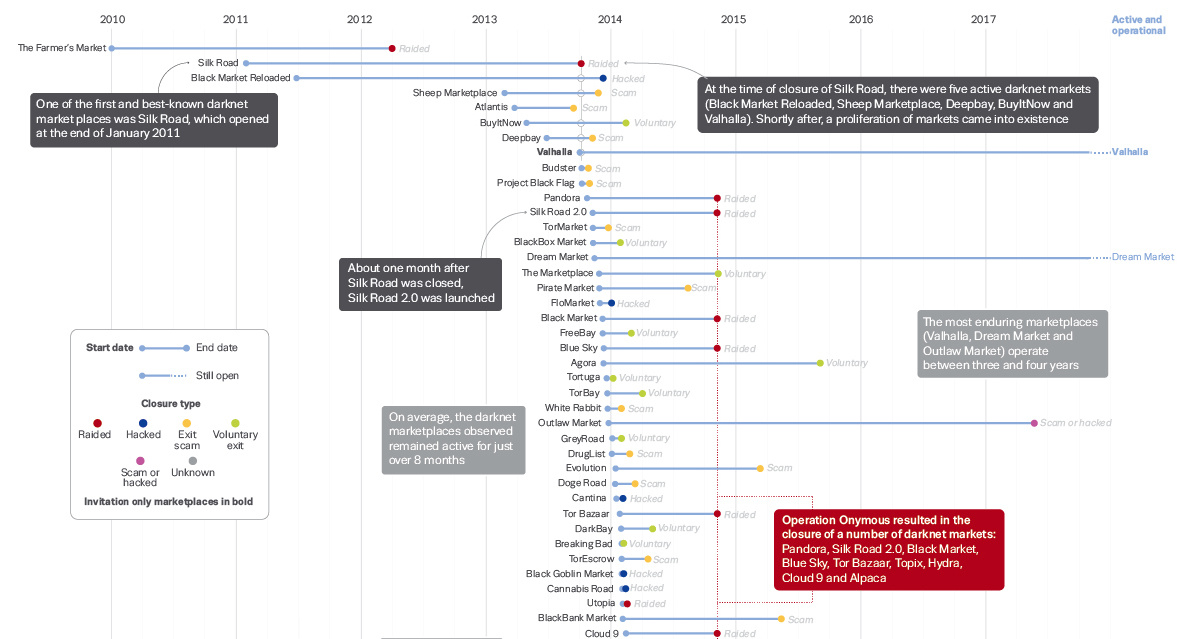Recently, the dark web has become well-known as a sanctuary for illegal actions and informal transactions. The attraction of being anonymous offered by hidden online marketplaces has captivated numerous participants seeking everything from legal and illegal goods to targeted services. Understanding the economic principles at play in these hidden marketplaces requires a closer examination of their specific interactions, the diversity of stakeholders and the elements leading to their expansion.
Darknet markets operate outside traditional economic models, often shrouded in a cloud of obscurity. This setting promotes both novelty and danger, empowering users to navigate a intricate landscape of market exchanges while also facing the constant risks of authorities and online crime. Investigating the interplay between anonymity, confidence, and availability and desire within these markets reveals not only their charm but also the obstacles that come with them.
Market Structure of the Dark Web
The deep web is characterized by a distinct market structure that operates outside the purview of traditional economic systems. It consists of a range of platforms, known as black markets, where users can privately buy and sell a wide array of products and services. These markets function on concepts of supply and demand, with offerings ranging from drugs to hacking services, and even digital currencies. The anonymity afforded by encryption and privacy protocols is a key feature that attracts both buyers and sellers, creating a unique ecosystem driven by discretion and often illicit activities.
Within this structure, the structure of dark web markets is often distributed. Unlike conventional markets that may be dominated by a few large players, darknet markets usually contain numerous small vendors competing for customers. This rivalry can lead to price volatility and differences in product quality. Additionally, the use of escrow services within transactions helps to foster confidence among users, mitigating the threats associated with online fraud. The decentralized nature also means that when one market is closed, others can quickly arise, maintaining an ongoing cycle of market evolution.
The financial interactions of the dark web are further influenced by the community and reputation systems in place. User feedback, ratings, and transaction histories play a critical role in trustworthiness of sellers and consumer behavior. Buyers often depend on reviews and past experiences to make informed decisions, while sellers attempt to build a positive reputation to attract more clients. This network of trust creates a more stable market environment, despite the intrinsic dangers and legal consequences associated with operating in the secrecy of the dark web.
Important Actors and Contributors
Within the illicit web ecosystem, there are several critical actors who shape the market dynamics. These include sellers, who are usually in charge of supplying products and services, and buyers, who seek to purchase these products. Vendors operate with different levels of business acumen, ranging from highly organized sellers to individuals engaging in irregular sales. The level to which they utilize encryption and privacy tools often determines their success and longevity in the market. Their reputation is vital, as feedback from prior transactions establishes trust and credibility in a largely unidentified environment.
Another key stakeholder is the transaction processor. In darknet markets, digital currencies, particularly Bitcoin, serve as the primary means of exchanges due to their concealed nature, allowing for a degree of secrecy. dark market list However, specialized services such as coin mixers and mixers also appear to additionally obfuscate the transaction histories, appealing to both vendors and buyers. These processors not only support transactions but also sometimes engage in money laundering, which adds a degree of complexity to the financial interactions of the dark web.

Lastly, police and regulatory agencies play a significant role as stakeholders, constantly adapting to the changing landscape of dark web markets. Their existence creates a tension between market participants, as authorities work to take down illegal operations while criminals innovate ways to evade detection. This ongoing battle influences the economic relationships, impacting vendors’ operational strategies and buyers’ decisions as they navigate risks associated with privacy and monitoring from authorities.
Economic Forces Driving Dark Web Operations

The dark web runs on a set of monetary forces that differ substantially from conventional economies. One of the most significant aspects is the anonymity provided to participants. This anonymity appeals to people looking to purchase or offer products and offerings that may be unlawful or scrutinized in the mainstream economy. The shortage of regulatory enables for cost dynamics that can differ widely depending on desire and supply, frequently resulting in exaggerated costs for particular products while rendering others more affordable.
Additionally, the availability of diverse cryptocurrencies as the main method of trade powers the darknet marketplace. These digital currencies offer individuals a extent of privacy and safety that mainstream payment systems are unable. The volatility of virtual currencies can lead to opportunistic trading actions among traders, often leading to a uncertain atmosphere where participants seek to capitalize on cost fluctuations. This cycle further entrenches the pattern of acquiring and selling, as individuals strive to take advantage of the market for monetary benefit.
In conclusion, the cutthroat nature of dark web economies incentivizes continual innovation among vendors. Vendors often strive to differentiate their services through item excellence, customer service, and distinct attributes. This competition fosters an ecosystem where more complex items and solutions are frequently released, including increasingly formalized business models resembling standard business models. As a result, the underground internet is not just a haven for unlawful conduct but also a complex monetary ecosystem shaped by its unique factors.
